Abstract
Short term treatment of rats with beta,beta'-tetramethylhexadecanedioic acid (MEDICA 16) results in a pronounced decrease in plasma very-low-density-lipoprotein (VLDL) cholesterol and VLDL triacylglycerol, previously ascribed to a decrease in liver VLDL production [Bar-Tana, Rose-Kahn, Frenkel, Shafer and Fainaru (1988) J. Lipid Res. 29, 431-441]. The hypolipidaemic effect of MEDICA 16 was further analysed here by monitoring plasma VLDL clearance and its hepatic uptake. VLDL triacylglycerol and VLDL apolipoprotein (apo) B fractional clearance rates were increased 7-8-fold in MEDICA 16-treated rats. The increase in the fractional clearance rate of plasma VLDL was essentially eliminated by functional hepatectomy. It was accounted for by activation of plasma VLDL uptake by the liver being completed during the first 4 min after the injection of the VLDL label and before commencement of uptake in non-treated animals. The hypolipidaemic effect of MEDICA 16 was accompanied by a 3.5-fold decrease in plasma apoC-III, but plasma apoC-III clearance remained unaffected by MEDICA 16. MEDICA 16-induced premature hepatic uptake of plasma VLDL due to suppression of apoC-III production may thus account for enhancement of plasma VLDL clearance in treated animals.
Full text
PDF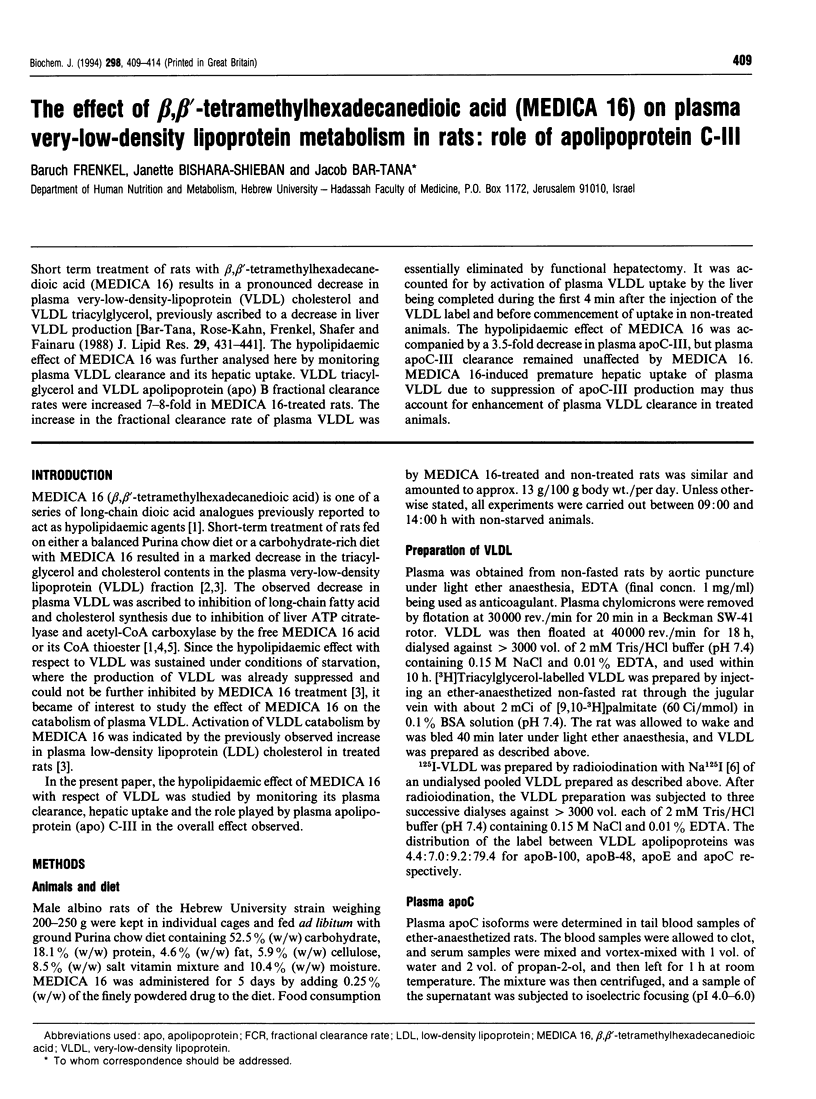
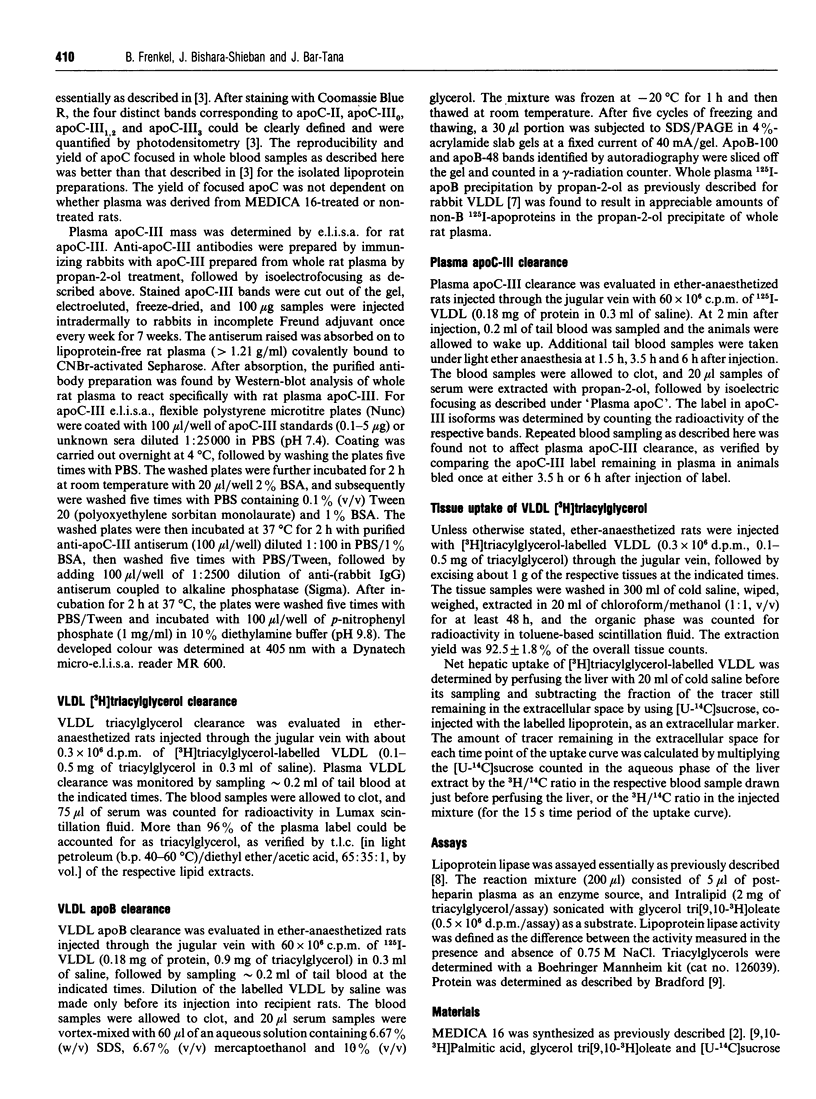
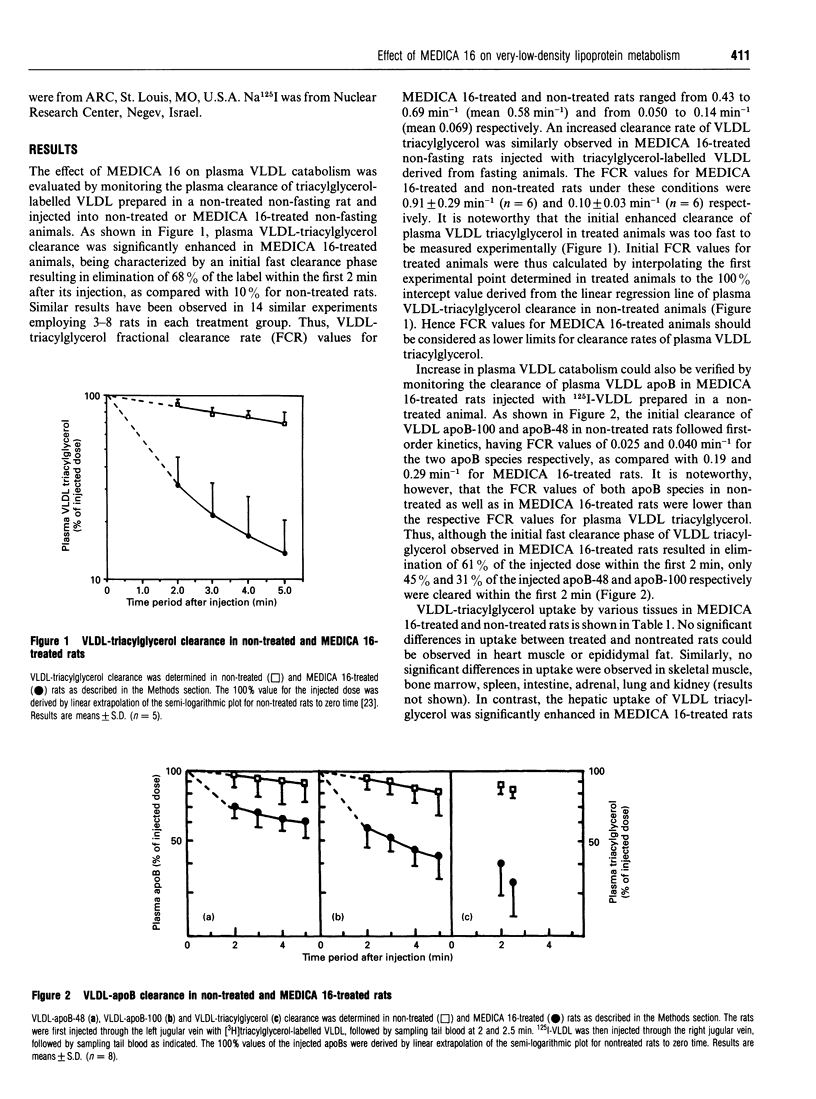
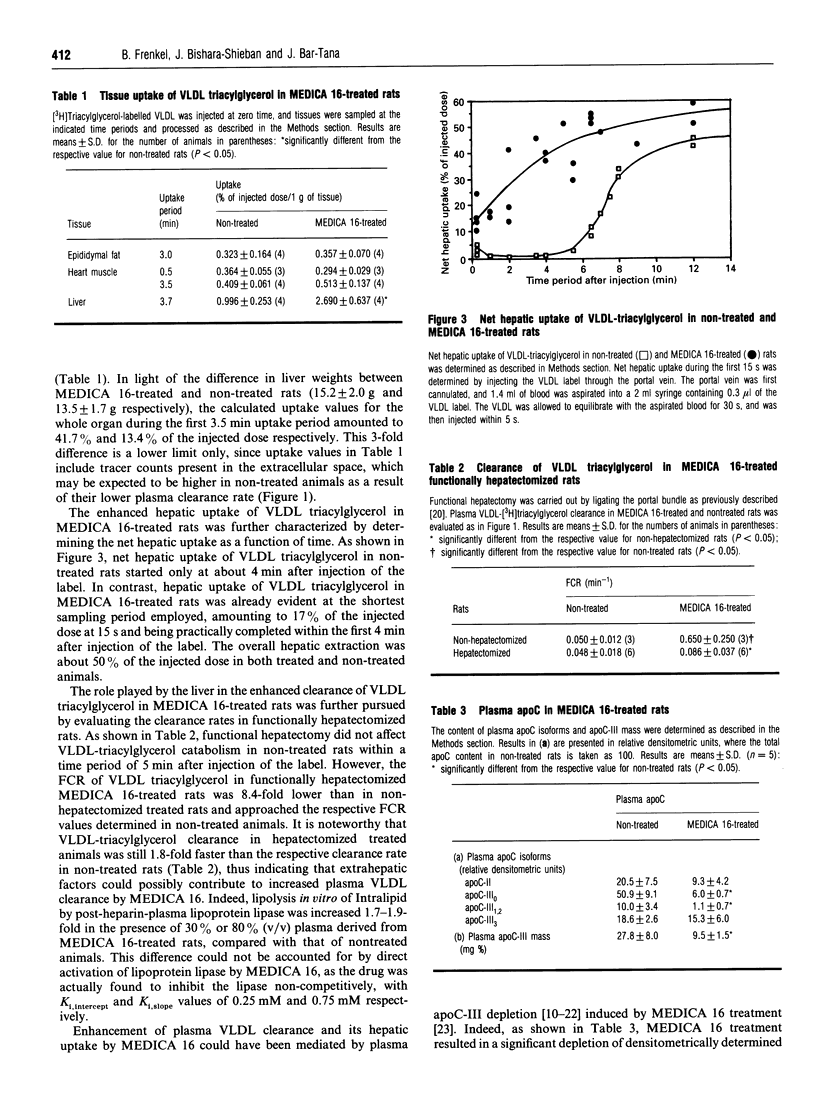
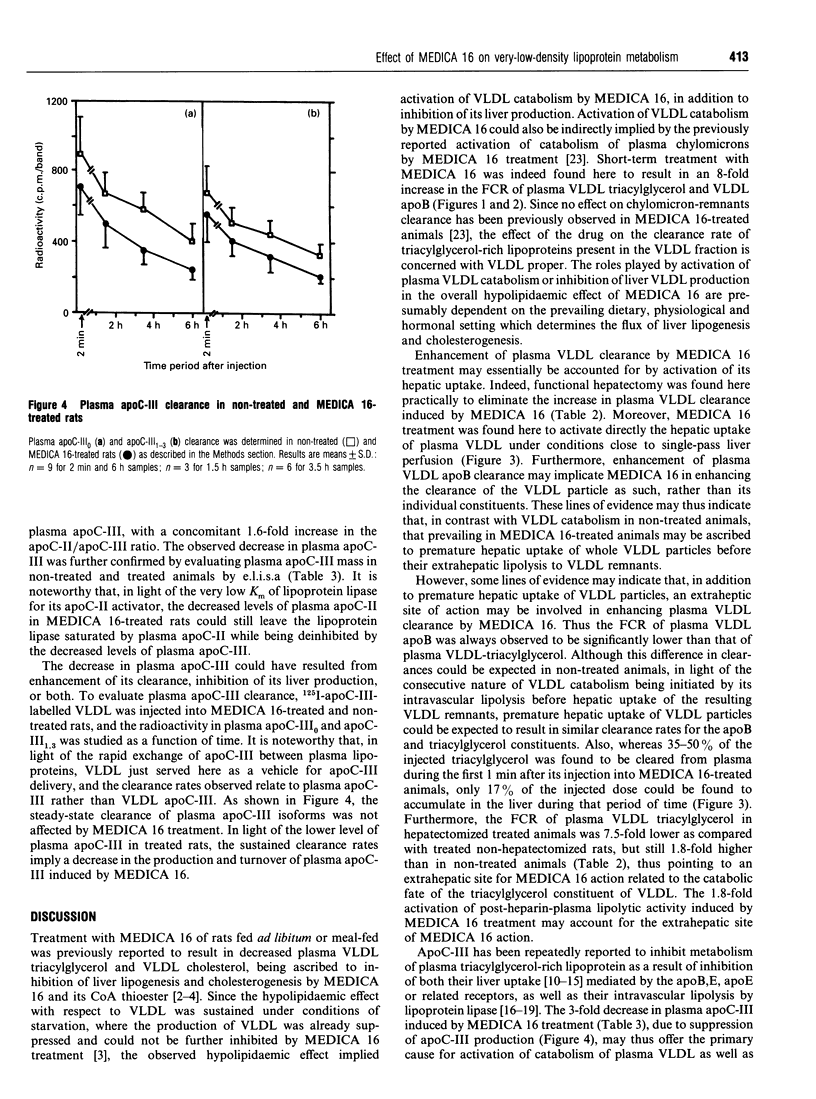
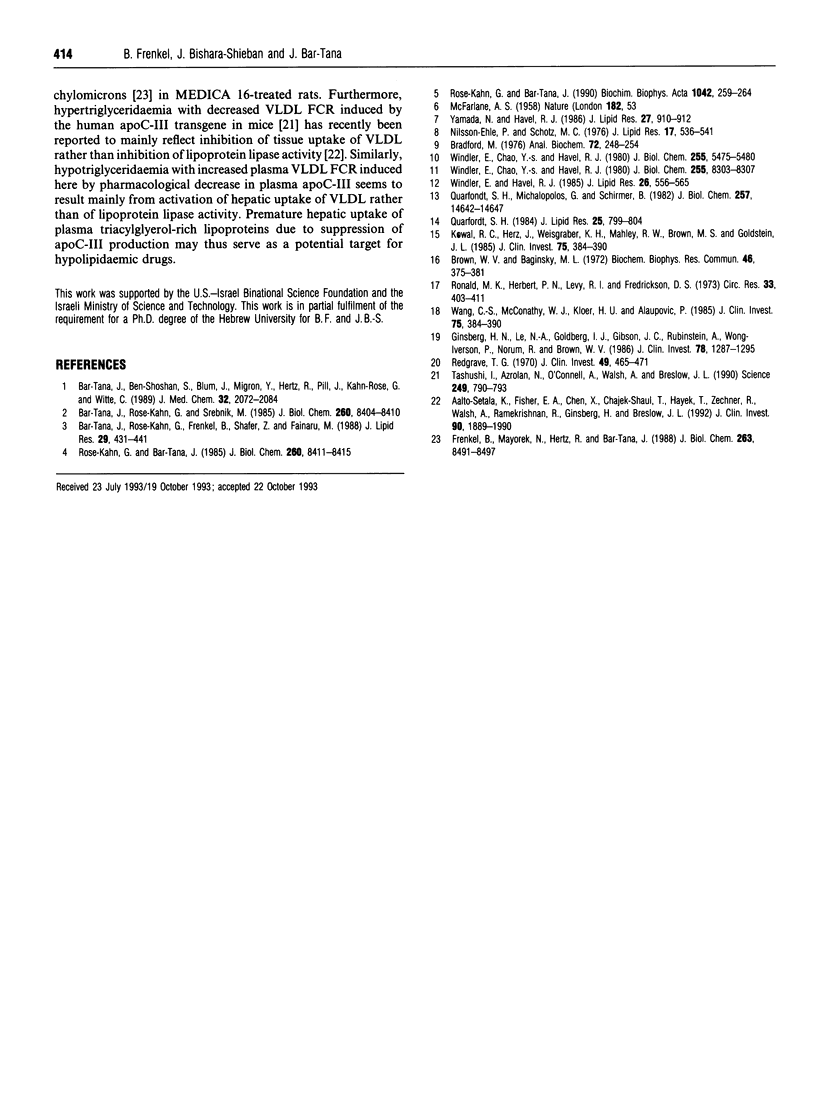
Selected References
These references are in PubMed. This may not be the complete list of references from this article.
- Aalto-Setälä K., Fisher E. A., Chen X., Chajek-Shaul T., Hayek T., Zechner R., Walsh A., Ramakrishnan R., Ginsberg H. N., Breslow J. L. Mechanism of hypertriglyceridemia in human apolipoprotein (apo) CIII transgenic mice. Diminished very low density lipoprotein fractional catabolic rate associated with increased apo CIII and reduced apo E on the particles. J Clin Invest. 1992 Nov;90(5):1889–1900. doi: 10.1172/JCI116066. [DOI] [PMC free article] [PubMed] [Google Scholar]
- Bar-Tana J., Ben-Shoshan S., Blum J., Migron Y., Hertz R., Pill J., Rose-Khan G., Witte E. C. Synthesis and hypolipidemic and antidiabetogenic activities of beta,beta,beta',beta'-tetrasubstituted, long-chain dioic acids. J Med Chem. 1989 Sep;32(9):2072–2084. doi: 10.1021/jm00129a010. [DOI] [PubMed] [Google Scholar]
- Bar-Tana J., Rose-Kahn G., Frenkel B., Shafer Z., Fainaru M. Hypolipidemic effect of beta, beta'-methyl-substituted hexadecanedioic acid (MEDICA 16) in normal and nephrotic rats. J Lipid Res. 1988 Apr;29(4):431–441. [PubMed] [Google Scholar]
- Bar-Tana J., Rose-Kahn G., Srebnik M. Inhibition of lipid synthesis by beta beta'-tetramethyl-substituted, C14-C22, alpha, omega-dicarboxylic acids in the rat in vivo. J Biol Chem. 1985 Jul 15;260(14):8404–8410. [PubMed] [Google Scholar]
- Bradford M. M. A rapid and sensitive method for the quantitation of microgram quantities of protein utilizing the principle of protein-dye binding. Anal Biochem. 1976 May 7;72:248–254. doi: 10.1016/0003-2697(76)90527-3. [DOI] [PubMed] [Google Scholar]
- Brown W. V., Baginsky M. L. Inhibition of lipoprotein lipase by an apoprotein of human very low density lipoprotein. Biochem Biophys Res Commun. 1972 Jan 31;46(2):375–382. doi: 10.1016/s0006-291x(72)80149-9. [DOI] [PubMed] [Google Scholar]
- Frenkel B., Mayorek N., Hertz R., Bar-Tana J. The hypochylomicronemic effect of beta,beta'-methyl-substituted hexadecanedioic acid (MEDICA 16) is mediated by a decrease in apolipoprotein C-III. J Biol Chem. 1988 Jun 15;263(17):8491–8497. [PubMed] [Google Scholar]
- Ginsberg H. N., Le N. A., Goldberg I. J., Gibson J. C., Rubinstein A., Wang-Iverson P., Norum R., Brown W. V. Apolipoprotein B metabolism in subjects with deficiency of apolipoproteins CIII and AI. Evidence that apolipoprotein CIII inhibits catabolism of triglyceride-rich lipoproteins by lipoprotein lipase in vivo. J Clin Invest. 1986 Nov;78(5):1287–1295. doi: 10.1172/JCI112713. [DOI] [PMC free article] [PubMed] [Google Scholar]
- Ito Y., Azrolan N., O'Connell A., Walsh A., Breslow J. L. Hypertriglyceridemia as a result of human apo CIII gene expression in transgenic mice. Science. 1990 Aug 17;249(4970):790–793. doi: 10.1126/science.2167514. [DOI] [PubMed] [Google Scholar]
- Kortz W. J., Schirmer B. D., Mansbach C. M., 2nd, Shelburne F., Toglia M. R., Quarfordt S. H. Hepatic uptake of chylomicrons and triglyceride emulsions in rats fed diets of differing fat content. J Lipid Res. 1984 Aug;25(8):799–804. [PubMed] [Google Scholar]
- Krauss R. M., Herbert P. N., Levy R. I., Fredrickson D. S. Further observations on the activation and inhibition of lipoprotein lipase by apolipoproteins. Circ Res. 1973 Oct;33(4):403–411. doi: 10.1161/01.res.33.4.403. [DOI] [PubMed] [Google Scholar]
- Nilsson-Ehle P., Schotz M. C. A stable, radioactive substrate emulsion for assay of lipoprotein lipase. J Lipid Res. 1976 Sep;17(5):536–541. [PubMed] [Google Scholar]
- Redgrave T. G. Formation of cholesteryl ester-rich particulate lipid during metabolism of chylomicrons. J Clin Invest. 1970 Mar;49(3):465–471. doi: 10.1172/JCI106255. [DOI] [PMC free article] [PubMed] [Google Scholar]
- Rose-Kahn G., Bar-Tana J. Inhibition of lipid synthesis by beta beta'-tetramethyl-substituted, C14-C22, alpha, omega-dicarboxylic acids in cultured rat hepatocytes. J Biol Chem. 1985 Jul 15;260(14):8411–8415. [PubMed] [Google Scholar]
- Rose-Kahn G., Bar-Tana J. Inhibition of rat liver acetyl-CoA carboxylase by beta, beta'-tetramethyl-substituted hexadecanedioic acid (MEDICA 16). Biochim Biophys Acta. 1990 Feb 6;1042(2):259–264. doi: 10.1016/0005-2760(90)90018-s. [DOI] [PubMed] [Google Scholar]
- Wang C. S., McConathy W. J., Kloer H. U., Alaupovic P. Modulation of lipoprotein lipase activity by apolipoproteins. Effect of apolipoprotein C-III. J Clin Invest. 1985 Feb;75(2):384–390. doi: 10.1172/JCI111711. [DOI] [PMC free article] [PubMed] [Google Scholar]
- Wang C. S., McConathy W. J., Kloer H. U., Alaupovic P. Modulation of lipoprotein lipase activity by apolipoproteins. Effect of apolipoprotein C-III. J Clin Invest. 1985 Feb;75(2):384–390. doi: 10.1172/JCI111711. [DOI] [PMC free article] [PubMed] [Google Scholar]
- Windler E., Chao Y., Havel R. J. Regulation of the hepatic uptake of triglyceride-rich lipoproteins in the rat. Opposing effects of homologous apolipoprotein E and individual C apoproteins. J Biol Chem. 1980 Sep 10;255(17):8303–8307. [PubMed] [Google Scholar]
- Windler E., Havel R. J. Inhibitory effects of C apolipoproteins from rats and humans on the uptake of triglyceride-rich lipoproteins and their remnants by the perfused rat liver. J Lipid Res. 1985 May;26(5):556–565. [PubMed] [Google Scholar]
- Yamada N., Havel R. J. Measurement of apolipoprotein B radioactivity in whole blood plasma by precipitation with isopropanol. J Lipid Res. 1986 Aug;27(8):910–912. [PubMed] [Google Scholar]


